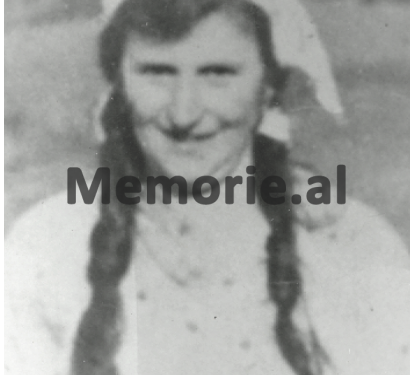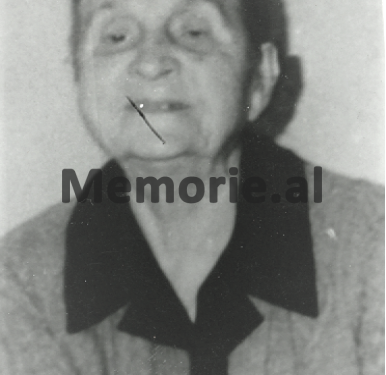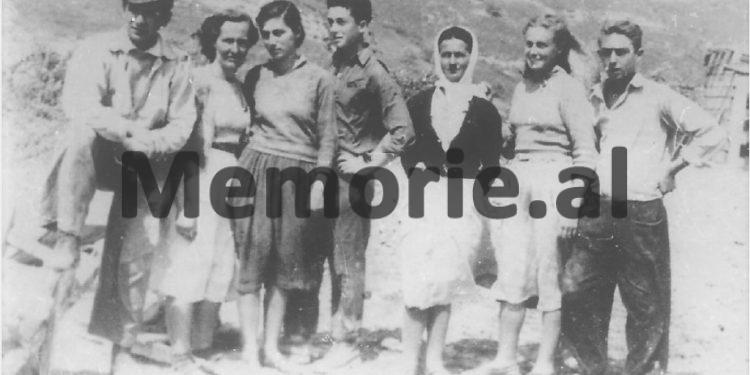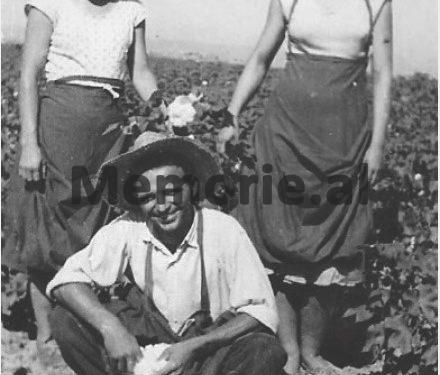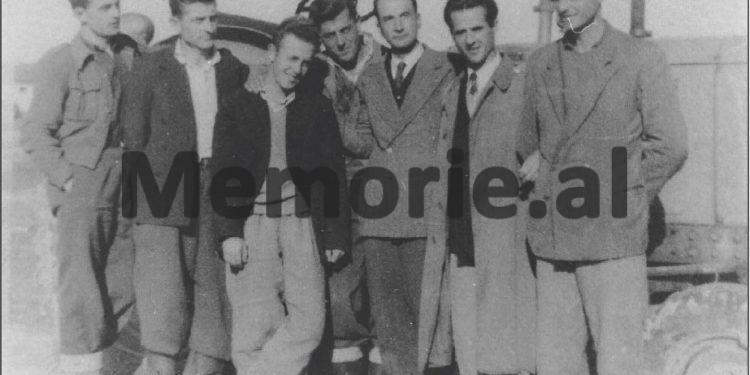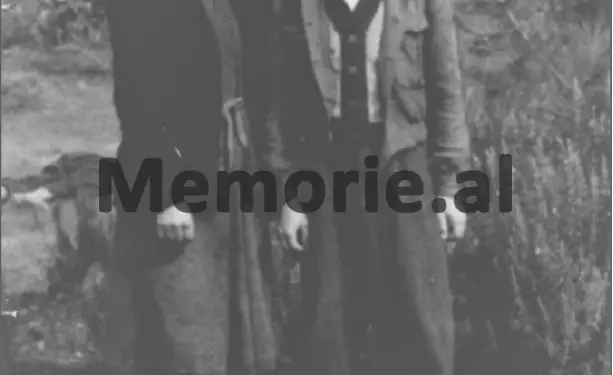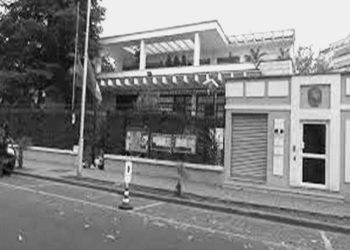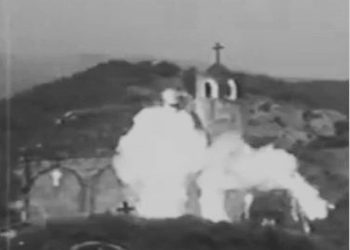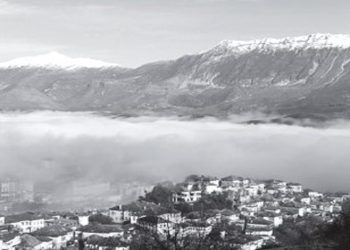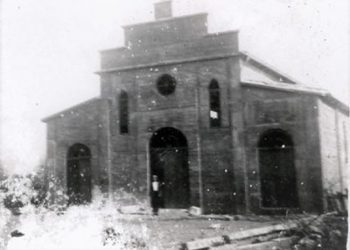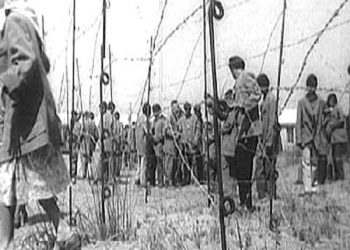Fatbardha Mulleti (Saraçi)
Part eight
Memorie.al publishes some parts from the book ‘Calvary of women in communist prisons’, by Fatbardha Mulleti Saraçi, (granddaughter of the famous former mayor of Tirana, Qazim Mulleti), whose family from 1944 until in 1991, he was persecuted by the communist regime of Enver Hoxha, where Fatbardha’s father, Haki Mulleti, a former senior state administration official since the 1920s, was imprisoned and interned by his family, until died in the hospital of Tirana, poisoned by the State Security. In her book ‘The Calvary of Women in Communist Prisons’, which is the fruit of several years of work, the author has masterfully described the unknown stories of some of the Albanian women and girls who suffered in prisons and internments in the dictatorial regime of Enver Hoxha, started by her mother, Pertefe Mulleti, and in turn: Marie Deda, Hajrie Kazazi, Kushe Seknej, Mrike Pali, Zyliha Rusi, Roza Jakova, Fatime Dilaveri, Hatixhe Pipa, Marije Gjoka, Angjelina Topalli, Hatixhe Kopliku, Nafije Kop Bushati, Budije Bushati, Adile Kazazi, Antonela Dostanishta, Nafije Stërmasi, Luçije Saraçi, Adile Meta, Qeuthere Meta, Feride Damnori, Vitore Ashta, Fetije Vuçiterni, Zehnije Gjylbegu, Xhyhere Kazazi, Luçije Malaj, Leadije Kazazi, Sadije Kazazi Hava Repishti, Luçije Kurti, Rukije Bushati, Shaqe Logoreci, Qamile Myftija, Marie Ndokëllia, Rozë Çefa, Çile Staku, Shaqe Marku, Lajde Arapi, Lutfije Barbullushi, Syme Muka, Zenepe Kraja, Fahrije Kazazi, Naxhije Plari, , Lizë Vukeli, Bade Kjaraj, Hava Baçi, Xhehadire Boriçi, Vitore Kalaj, Katerina Benusi, Sofije Baja, Lenë Pjetri, Dava Markagjoni, Mrika Markagjoni, Marta Gjonmarkaj, Bardha Gjon Markagjoni, Kristina Gjomarkaj, Çelestina Pervizarki, Kune Miraka, Sultana Dine, Vera Dine, Agime Dine, Hamide Çela, Vera Dine, Kadrije Cami, Sanije Sulaj, Meliha Sulaj, Vashe Kola, Prena Llesh Gjeçi, Gjystina Seku, Ilda Melgusha, Agime Pipa (Aranitasi), Terezina Pali, Liza Pali, Adile Boletini, Nasibe Kazazi, Ana Daja, Dila Zef Ndoja, Zyraka Mano, Shanisha Dosti, Zojë Gjeloshi, Drane Stakja, Elena Luli, Sabiha Kasimati, Marije Deda, Marije Shllaku, Biçe Pistulli, Sadije Kazazi, Gjyzepina Çoba, Marta Doda , Frida Satedini, Vitore Kuka, Gjela Llesh Biba, Bardha Cub Marku, Liza Llesh Mali, Bardha Mark Bushkola, Marije Tuci, Olimbi Baruti, Angje Kovaçi, Bedrije Ashikja, Musine Kokalari, Motër Gjeorgjina, Liljana Radovani, Laura Keqi, M Mrike Zadeja, Angjelina Shantoja, Naime Koçi, Sheriar Sefa, Vitore Shllaku, Liza Gjon Voci, Nina Shiroka, Laje Mehmeti (RRema), Feride Beshiri (Quku), Hasije Ulqinaku (Quku), Sofije Kali, Çile Gjush Larja, Nurfezo Koprencka, Sanije Gjylbegu, Emilja Shest Bregu, Vida Radovani, Nedrete Pipa, Motrat e Osman Kazazi, Safete Jusif Sokoli, Çiljeta Simoni, Lutfije Buashati, Sadije Bushati, Olga Schëeizer Libohova, Evelina e Ndoc Naraçi, Geraldina Apony-Zogu, Hilda Zyma. Marie Rafael, Zade Muka, Rukije Bushati, Hajrie Vrioni, Emine Gjyrezi, Xhemile Beqir Komi, Hedije Dume Repishti, Syme Muka, Fetije Vuçiterni, Sebije Puka, Marjeta Serreqi, Dhurata Sokoli, Klara Miraka (Merlika), Asi , Liri Cenaj, Rudina Dema, Adelajde Miraka, Drane Jakja, Syriha Hasi, Aishe Gogaj, Luçija Kaçaj, Gjyljana Malaj (Pervizi), Nadide Kasaruho, Nadire Kërçiku (Peshkëpia), Shpresa Ballolli (Merdani), Makbule Frashëri, Misly Çrash Dervishi (Leka), Natali Arkandi Rozengolc (Pengili), Vigelmina Vitalij Kovaleshko (Veshi), Rukije Rama, Tefta Tasi, Liri Lubonja, Kozara Kati, Shpresa Ngjela, Vera Bekteshi, etc.
Continued from the previous issue
Rukije Bushati
(1875 – 1959)
Mankind is always indebted to their mothers. Life is such that with some it is stingy and with some others it is generous in what it brings. Those who knew Mother Rukija or Hanko Kija imagine it this way: with an average body, a bit like a gathered, not so much by age as by constant shyness. The always clean snow cover hid the hair, the ears, and the neck of a part of the forehead. Her white, clean and smooth face where there were no wrinkles preserved the traces of an unusual beauty.
He was born in Ulcinj and grew up in Shkodra. After the completion of Mejtep, the teachings of the religion left deep traces in her sensitive soul. Thanks to these feelings, she found strong support of consolation to cope with the turbulent family life. Her husband left her a widow early, but she kept the suffering inside. Another great and unforgettable pain was the sudden death at a wedding of his older brother, whom he would later remember with the words “we shorten our lives brother”.
Until 1930 she lived in the house of her brother-in-law, Sylçe Bushati, behind her on her own. In 1940, his son, Myfiti, goes to study in Italy, but his health does not lead him, so after 2 years he returns. A strong motive was also the obligation he felt to serve the homeland, which had been violated by a foreigner. On this occasion he brought from Italy a cyclostyle, by turned the house into a nationalist base. He did not delay and joined the ‘National Ball’. Now Nana Kije had a son and she did not have one. For some time (1943), it was illegal. Nana Kije gave bread and shelter to some of their communist cousins and comrades. She could not get out of performing hospitality tasks.
On the other hand, she was convinced that they were deceived. Their infidelity would appear immediately after the “liberation” of the country. December 1944. Sylçe beg Bushati finds refuge in her house, but it did not take long and the cleansing operation, led by Mehmet Shehu, would lead to the arrest of her son and son-in-law. 30 years in prison for the boy. That long drama started to be played for this family, the walkers from Shkodra to the Tirana prison, to the camps at Ura e Bonës, in Maliq, in Beden …! Our years. Her motherly heart of a decade felt sharp pain.
Permanent anxiety and unspeakable longing, but always with a dignified attitude, with restraint…! To the vicissitudes of the prison troubles was added the other affliction. After her house was confiscated, she moved to a village where her son-in-law was living at the time, with whose family he lived until his death.
The boy was released sick and disabled. A few months before his release, the groom, who considered him his son, was also imprisoned, so he became interested in him as well. To make ends meet, his son had to do all sorts of hard work. As well as the daughter, the mud of Bërdica. It should not be forgotten that they were at the top of the list when it came to labor cuts. This forced the desolate old woman not to lead her head out of the hammer, where she was weaving cotton thread for the weaving factory. She
had the joy of her son’s engagement, but did not enjoy his marriage, because after two major surgeries, she died in 1959. Her life was very frugal in joys, but very generous in turmoil.
Shaqe Logoreci
(1890 – 1953)
Born and raised 9 children. Thanks to her and her husband’s family traditions, she educated them with a sense of patriotism. In addition to participating in the 1939 demonstrations against Italian fascism, they later joined nationalist groups, or propagated the national cause. Filip was a member of the presidency of the National Front, while Antoni called on the people for resistance through Radio London. The doors of fascist prisons would open for Philip and Gaspr. Later they would go out to the mountains. Nana Shaqe, not only knew about the activity of children who were prematurely mannish, but also helped them as much as she could, despite the dangers she might have.
The disasters, in the full and savage sense of the word, began after the communists came to power. The house began to be “emptied”. Filip, although seriously ill, is arrested and sentenced to 7 years in prison on charges of being an anti-communist and ardent nationalist. The other boy, Gasprin, was mobilized by partisan brigades when they marched on Yugoslavia, from where he barely made it. Zefi was forced to emigrate. She did not know that she would never see him or Anton again. The tears of separation were truly bitter. Other tears would be shed again: eviction, confiscation of property, denial of work, censorship of papers…! The boy had to be helped in prison. There, after an infection, they would cut off his arm…!
Difficult economic conditions would worsen everyone’s health. Hospital admissions became commonplace. Filipi, Rroku and Vitoria also tried the senatorium…! Poverty was sitting cross-legged on the mahogany. The mother of 9 children was almost alone: some in hospitals, some with work away from home, and two emigrated … She especially missed them. Every night she would sit and listen to the BBC in a low voice, from where she would hear her son’s cry. It was her only consolation. It seemed to him that he had them in the room, as if they were crying for each other. When the show ended, she bent down slightly and kissed the radio.
Every night so. He was right, his son, who in London had titled his book: “Albania – The living forgetfulness of this Europe”. Mother Shaqja thought of her children, her heart was broken when she saw the persecution. With a mountain of suffering, he closed his eyes at a relatively young age. God did not punish him more, because he did not see his son, Philip; die after a year, and later the girl…
Qamile Muftija
(1903 – 1974)
Even for Qamile Mufti, life came full of vicissitudes after 1944. Her husband, Salih Muftia, was honored in the circle of Muslim believers and in the people of Shkodra (he was an exponent of the Legality organization), after trying to exile the Italian fascists, he was forced to escape at the end of the black november of that year, he left his wife and seven children (from 3 – 13 years old). Initially she underwent 5-week detention. Then expropriation and others…! Four years later, her 17-year-old son, from the high school benches, crashed into Security cells, to prove his torture and later another five years in prison. It was still early…! The year 1962 would give it an even heavier blow. The other boy, Mithati, who was by nature very sensitive, did not tolerate persecution, goes into a nervous crisis. One boy in prison, another in Psychiatric Hospital, the man on the run. What to think about first? Again, there was even blacker …! That year, she and her two remaining sons were exiled. He was 60 years old and would have to make a living doing various agricultural jobs. Like many of her friends…! With the thought that one day he would return home, with the thought that his son would recover.
Only he could recover, even though almost everything was missing in the barracks, even though he did not have the strength to cope with the hard work. It did not occur to him that the boy, after interrupting his treatment, would hit the mud of Myzeqe, where he was himself. Could her heart endure this tired state? I needed it. The boy needed more than anything for her warm word, which only from the depths of her soul could come out. It gave her calmness, warmth, tenderness.
He also gave her the confidence for a better day, opened her horizon, and told her to look beyond, to the blueness that was to come. The economic situation would not be better even when they returned from exile. All in manual labor, all in heavy labor. Although we cultured because they had not taken the book out of their hands, they could not find a better job. And my mother suffered from this as well. They especially suffered the persecution of people dressed in power. How many times did the opportunity arise? Vuante especially Mithati. He was also killed by the pity of his lovers, until one day, who consciously closed his life under the wheels of a truck.
History knew of such cases, but generally had not dealt with the spirit world of the nannies that had to cope with the pain that was coming back. After a while he died himself. “She is not dead. ”She exploded,” said the daughter. And he was right.
Marije Ndokëillia
(1919 – 1975)
She remained an orphan at a young age. He was from the city of Korça and grew up in a family of clerics with patriotic and cultural traditions. The spiritual suffering, which was so natural with the death of her mother, ennobled her soul even more. She was very wise and loving with people; human soul as it is said.
He marries Pashuk Ndokëillina from Shkodra, who was known for his deep culture and wide range of interests, and who was left a widow with two children, Antoneta, 8, and Ilian, 5. Marija, or Rija, as the close circle called her, thus became the stepmother of these two children found. It was not like those fairy tale stepmothers. She became the second real mother. She poured all her human soul on those little girls, who were waiting so much for her, you looked at her with those awake and searching eyes.
He loved them and they loved him. He designed and designed them, behaved like their real mother and they respected her. He sacrificed for them and they remember him. This was Rija. He lived longer with Ilian, as Antoneta was still in school and would later start working away from home. Although very young, Elijah devoted himself to the national cause. As an anti-fascist he fought against them. Many times his house was raided and it was she, Rija, who hid everything compromising. He escaped the fascists, but not the communists.
In January 1945 he was arrested and given a sentence of 15 years. The whole family was thus condemned. Everyone felt the savage consequences of the new dictatorship, which showed its teeth from the beginning.
The geography of the prisoner’s movement contains many names of camps, so we hear about the horrors we live in (Shkodër – Maliq – Beden – Orman – Pojan – Peqin – Beden – Lekaj – Gocë – Lapardha – Vlashuk – Levan – Shtyllas …). Places where prisoners remembered the slaves of antiquity. Lots of work and little food. It was the hand of Rija, like that of God, who saved Ilian. She was always near him in every camp, you sent him food to keep the body and warmth of the family, to keep his morale high. And everywhere they happened. Without counting the difficulties, without counting the insults of the officers and the people sold for 30 aspra, who called the boy “enemy of the people”, without counting her health that was falling. Without telling tell to anyone about this suffering. Always with courage, always with smiling eyes, with deep different pain. It was only Elijah who needed her help. The daughter also needed support, because, although with a newborn child, she was transferred to Kruja. The house had to be maintained; it had to be a man, after Pashuk had been deported to the depths of Puka. All of this was “recorded” in her health, until one day she was paralyzed. Not a little, but 12 years. Then the downfall came with a rush: at first they cut off one leg, later the other. In the end came death, creating a void in the hearts of its people, which could be filled, as it happened, except with the deep gratitude of all.
Rozë Çefa
(1900 – 1994)
“Nations are born in the lap of mothers,” Napoleon once said. Rozë Çefa represents those Albanian mothers, who performed their duties, full of zeal and virtue and at the same time, full of endless suffering and worries. He grew up in a patriotic family, where bread was not lacking, but also where luxury was not known. Tue attends school near stigmatized nuns, is one of the founders of the Association “Daughters of Our Lady”. She was only 14 years old when, with many of her friends, she performed in the drama “From slavery to freedom”. He instilled the patriotic spirit and intellectual interests, together with the bread, with his children. During the so-called national liberation war, his family joined the nationalist wing, represented by the National Front.
The consequences were not long in coming. The year 1949, the eldest son, Tishi, spent under the torture of communist investigators, but did not bow down. She did not bow down either, although she learned of the 20-year sentence. “God did not punish him, but the slave, do not be upset, because he will not feel that way”, – he encouraged the upset children. Our years, then, more and more old, with strikes in hand, roamed the streets of Albania, and stopped at one station and another at another, where his son was serving his sentence: Fier – Vlonë – Ura Vajgurore – Radostina – Shegan (“Oh God, who says Albania is small?” …) – Vladushk – Myzeqe Canal – Korca – Bulqiza – Tirana. And where it did not go, you knock on those black iron doors…! It was horrible to write the words “Enemy of the people” next to the prisoner’s name and surname (otherwise they could not get the food into his son’s hand).
It also happened not to meet him. They were so tired, she was forced to listen: “You are not here. He is in prison because he objected. “Or: He’s in jail and maybe he’s dead.” One day in Tirana Prison they told him: “They transferred him to Vlona.” The deserted mother leaves, disguising as much as she can those damn words “Enemy of the people” (even the plight of the drivers …). They finally arrive. “You do not have it here” – they say there. Returns. On the way he sees a car with the prisoner.
It looks like someone makes them by hand. He finds out that they were going to Bulqiza. Run for there. Walk and walk, just as you sit with your eyes and mind with God. He does not find it in Bulqiza either. A policeman, when he finds out about her vicissitudes, regrets it and says: “My old woman, you have it in Tirana. Ask there to have a net, since no one has been transferred from Tirana Prison. ” Once again to where he finally finds it. ”Did not the Virgin suffer for her Son?” – would tell later.
So for 15 years, until the son is released to bring with him the serious illness. It was Mother Roza, who would do her best to heal her with warm words, with the optimism born, with nature and laughter. This is how everyone knows him, especially the neighbor. The beggars never returned them, but their hands were filled with what happened to them. “But you, my Pink, have something for yourself,” someone said. “Whoever has little forgiveness,” she replied, “deserves more.” The last twenty years, from long sufferings, remained paralyzed. And after seeing once again the opening of churches and the coming of democracy, he closed his eyes and was satisfied, after he had completed all the tasks, just as he had been taught since he was little…! Memorie.al
The next issue follows





